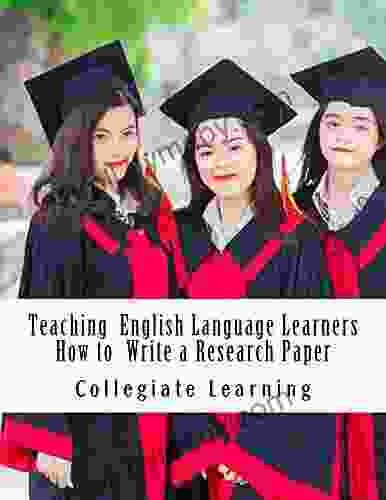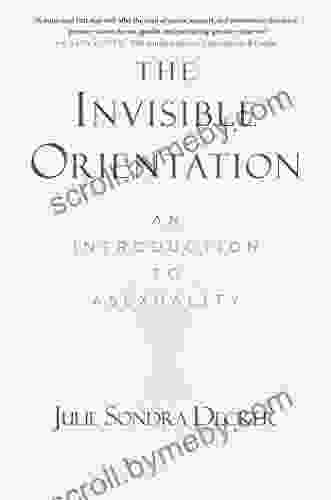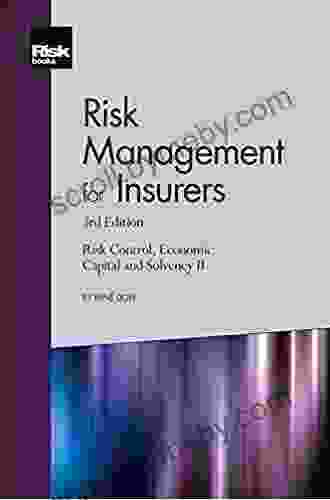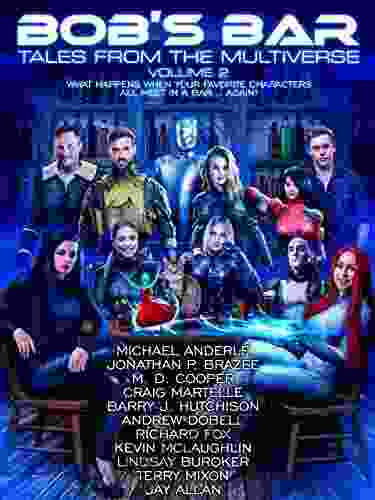Empowering English Language Learners: A Comprehensive Guide to Writing Exceptional Research Papers

In the ever-evolving academic landscape, research writing holds a pivotal place. It is a gateway to unlocking knowledge, fostering critical thinking, and honing communication skills. However, for English language learners (ELLs),the task of writing a research paper can seem daunting. Cultural differences, linguistic barriers, and unfamiliar academic conventions can hinder their progress. This comprehensive guide aims to empower ELLs by providing a structured approach to writing exceptional research papers, equipping them with the necessary knowledge, skills, and tools to succeed in their academic endeavors.
4.2 out of 5
| Language | : | English |
| File size | : | 5101 KB |
| Text-to-Speech | : | Enabled |
| Enhanced typesetting | : | Enabled |
| X-Ray for textbooks | : | Enabled |
| Print length | : | 241 pages |
| Screen Reader | : | Supported |
Understanding the Research Process
The foundation of effective research paper writing lies in a thorough understanding of the research process. ELLs should be guided through the following steps:
- Selecting a Topic: Encourage ELLs to explore topics that resonate with their interests or areas of curiosity. Provide scaffolding by offering a list of suggested topics or guiding them to relevant resources.
- Formulating a Research Question: Help ELLs develop a specific, focused, and answerable research question. This question should guide their research and shape the structure of their paper.
- Gathering Sources: Instruct ELLs on how to identify credible and relevant sources, including academic journals, books, and websites. Introduce them to research databases and provide guidance on keyword search techniques.
- Evaluating Sources: Teach ELLs the criteria for evaluating the credibility and reliability of sources. They should be able to assess the author's qualifications, the currency of the information, and the potential biases or limitations.
- Organizing and Synthesizing Information: Provide clear guidance on organizing research findings into coherent sections. Emphasize the importance of synthesizing information from multiple sources and avoiding plagiarism.
- Writing and Revising: Throughout the writing process, offer ongoing support and feedback. Encourage ELLs to draft, revise, and refine their work multiple times, focusing on clarity, organization, and proper citations.
Addressing Linguistic Challenges
ELLs may face linguistic challenges that affect their research paper writing. To address these challenges, consider the following strategies:
- Provide Language Support: Offer ELLs access to language support services, such as writing tutors or workshops that specifically address the linguistic needs of non-native speakers.
- Use Visual Aids and Graphic Organizers: Incorporate visual aids and graphic organizers to help ELLs understand complex concepts and organize their ideas.
- Encourage Collaborative Writing: Pair up ELLs with native English speakers or other fluent learners to facilitate language exchange and peer support.
- Provide Feedback and Model Texts: Offer regular feedback on ELLs' writing, focusing on both content and language accuracy. Provide model texts that demonstrate strong writing skills and proper academic language.
Developing Critical Thinking Skills
Beyond linguistic proficiency, critical thinking skills are essential for effective research paper writing. ELLs should be encouraged to:
- Question Assumptions: Challenge ELLs to examine the underlying assumptions and biases in their sources and to consider alternative perspectives.
- Analyze Evidence: Guide ELLs in evaluating the strength and relevance of evidence, identifying potential flaws, and drawing logical s.
- Formulate Arguments: Support ELLs in developing well-reasoned arguments, backed by evidence, that address the research question.
- Consider Multiple Viewpoints: Encourage ELLs to recognize and acknowledge differing viewpoints and to incorporate them into their discussions, demonstrating a balanced and nuanced approach.
Harnessing Digital Tools and Resources
Leverage technology to enhance the research paper writing experience for ELLs:
- Citation Management Tools: Introduce ELLs to citation management tools that streamline the process of organizing and referencing sources.
- Online Writing Tools: Utilize online writing tools that provide grammar and spell-checking, language translation, and plagiarism detection.
- Research Databases: Provide access to online research databases that offer a comprehensive collection of academic resources tailored to different disciplines.
- Virtual Collaboration Tools: Facilitate collaboration among ELLs through virtual platforms that allow them to share ideas, exchange feedback, and work on shared documents.
Additional Tips for Educators
To support ELLs in writing exceptional research papers, educators can:
- Create a Supportive Learning Environment: Foster a classroom culture that values diversity, encourages collaboration, and provides a safe space for students to ask questions.
- Provide Differentiated Instruction: Tailor instruction to the individual needs of ELLs, offering differentiated assignments and support materials.
- Collaborate with Other Professionals: Engage with ESL teachers, writing tutors, and school counselors to provide comprehensive support for ELLs.
- Monitor Student Progress: Regularly assess ELLs' progress and provide timely feedback to support their ongoing development.
Teaching English language learners how to write exceptional research papers is a multi-faceted endeavor that requires a comprehensive and supportive approach. By understanding the research process, addressing linguistic challenges, developing critical thinking skills, harnessing digital tools and resources, and providing additional support, educators can empower ELLs to overcome barriers and achieve success in academic writing. This guide serves as a roadmap for educators, providing practical strategies and resources to foster the development of confident and capable research paper writers among ELLs.
4.2 out of 5
| Language | : | English |
| File size | : | 5101 KB |
| Text-to-Speech | : | Enabled |
| Enhanced typesetting | : | Enabled |
| X-Ray for textbooks | : | Enabled |
| Print length | : | 241 pages |
| Screen Reader | : | Supported |
Do you want to contribute by writing guest posts on this blog?
Please contact us and send us a resume of previous articles that you have written.
 Book
Book Novel
Novel Page
Page Chapter
Chapter Text
Text Story
Story Genre
Genre Reader
Reader Library
Library Paperback
Paperback E-book
E-book Magazine
Magazine Newspaper
Newspaper Paragraph
Paragraph Sentence
Sentence Bookmark
Bookmark Shelf
Shelf Glossary
Glossary Bibliography
Bibliography Foreword
Foreword Preface
Preface Synopsis
Synopsis Annotation
Annotation Footnote
Footnote Manuscript
Manuscript Scroll
Scroll Codex
Codex Tome
Tome Bestseller
Bestseller Classics
Classics Library card
Library card Narrative
Narrative Biography
Biography Autobiography
Autobiography Memoir
Memoir Reference
Reference Encyclopedia
Encyclopedia Craig Wiggers
Craig Wiggers Elizabeth Drew
Elizabeth Drew Dahlia Mertens
Dahlia Mertens John Brant
John Brant Joe Borelli
Joe Borelli Cooper The Pooper
Cooper The Pooper Conor Daly
Conor Daly Jennifer Comeaux
Jennifer Comeaux William Feaver
William Feaver Lorraine Bartlett
Lorraine Bartlett Colin Guare
Colin Guare Henry Treece
Henry Treece Edward Jay Epstein
Edward Jay Epstein Henry Freeman
Henry Freeman Debbie Jorde
Debbie Jorde William Sitwell
William Sitwell James B Cohoon
James B Cohoon S W Well
S W Well John C Ford
John C Ford Colleen Alexander Roberts
Colleen Alexander Roberts
Light bulbAdvertise smarter! Our strategic ad space ensures maximum exposure. Reserve your spot today!
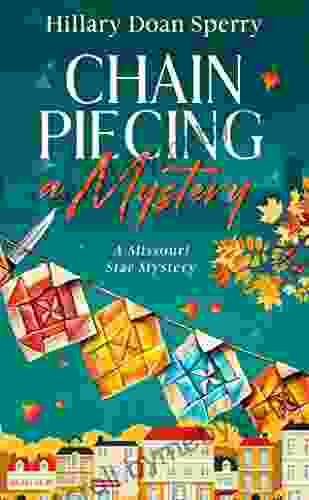
 Miguel de CervantesChain Piecing Mystery: The Captivating Missouri Star Mystery That Will...
Miguel de CervantesChain Piecing Mystery: The Captivating Missouri Star Mystery That Will... Ben HayesFollow ·16k
Ben HayesFollow ·16k Stuart BlairFollow ·11.3k
Stuart BlairFollow ·11.3k Forrest BlairFollow ·13.2k
Forrest BlairFollow ·13.2k Ralph Waldo EmersonFollow ·9.9k
Ralph Waldo EmersonFollow ·9.9k Darius CoxFollow ·14.9k
Darius CoxFollow ·14.9k Randy HayesFollow ·19.5k
Randy HayesFollow ·19.5k Logan CoxFollow ·5.4k
Logan CoxFollow ·5.4k Enrique BlairFollow ·3.3k
Enrique BlairFollow ·3.3k
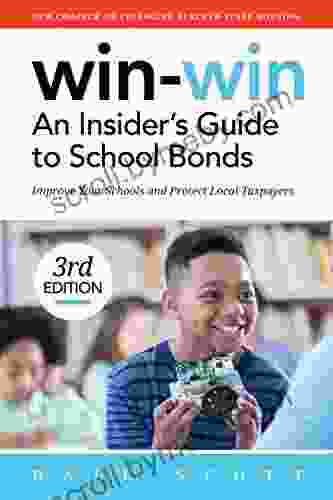
 Cruz Simmons
Cruz SimmonsUnveiling the Secrets: An Insider Guide to School Bonds...
Unlock the Power of School...
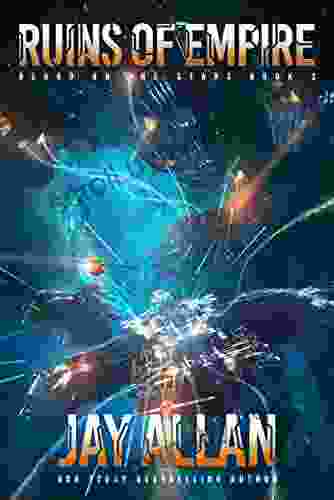
 Gil Turner
Gil TurnerRuins of Empire: Blood on the Stars - The Epic Space...
Ruins of Empire: Blood on the Stars is the...
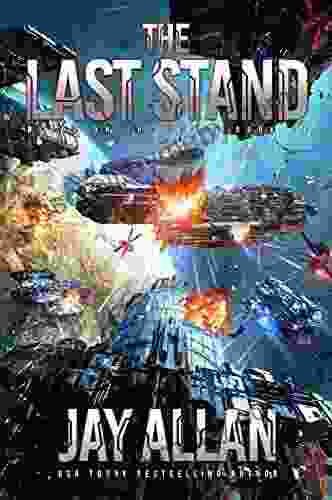
 Allen Ginsberg
Allen GinsbergPrepare for the Ultimate Space Opera: Delve into The Last...
Embark on an...

 Anton Foster
Anton FosterUnleash Your Inner Artist: The Ultimate Guide to Oil...
Chapter 1: The...
4.2 out of 5
| Language | : | English |
| File size | : | 5101 KB |
| Text-to-Speech | : | Enabled |
| Enhanced typesetting | : | Enabled |
| X-Ray for textbooks | : | Enabled |
| Print length | : | 241 pages |
| Screen Reader | : | Supported |


